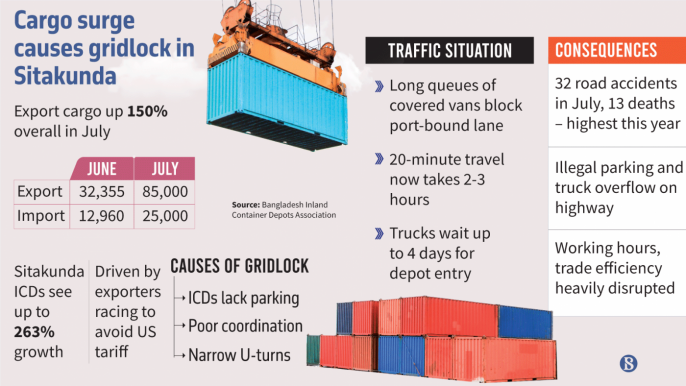Traffic Congestion: A Growing Concern
The Dhaka-Chattogram Highway, a vital trade route for Bangladesh, is currently grappling with significant traffic congestion. In July, the highway became a scene of gridlock, primarily fueled by a surge in cargo volumes. This article delves into the details of this situation, highlighting key statistics and insights into how it impacts logistics and transportation in the area.
A Snapshot of the Situation
- Cargo traffic volumes have risen dramatically, causing severe gridlock.
- Export cargo surged by up to 263% at various Inland Container Depots (ICDs).
- Trucks are now waiting for several days to enter congested depots, affecting traffic flow.
- Poor scheduling and a significant lack of parking space have exacerbated the crisis.
- Increased road accidents have been reported during peak traffic in July.
- There are growing calls for enhanced ICD capacity and improved logistics planning.
Export Volumes and Its Consequences
According to the Bangladesh Inland Container Depots Association (Bicda), overall export cargo volumes at 19 ICDs surged by 150% in July. The five ICDs in Sitakunda experienced an astounding increase ranging from 127% to 263%—a result of exporters hastily dispatching goods before the impending US tariff effective August 1.
The impact of this scramble to export is twofold. While it indicates a robust demand for Bangladeshi products, it also puts a strain on logistics and transportation networks, leading to highly congested conditions on the road. The normal travel time of 20 minutes from Kumira in Sitakunda to AK Khan Gate in Chattogram now stretches to between 2 to 3 hours.
Logistical Challenges and Traffic Snarls
The handling capacity of the ICDs is being tested this July. Chattogram’s ICDs processed approximately 85,000 TEUs (Twenty-foot Equivalent Units), a record high for the past seven months. The proportions tell a true tale—import cargo volumes doubled compared to June, creating a significant backlog of trucks along the highway.
Volume Comparisons
| Month | Export TEUs | Import TEUs |
|---|---|---|
| January | 70,338 | 21,039 |
| February | 61,672 | 21,847 |
| March | 63,692 | 21,264 |
| April | 49,345 | 22,476 |
| May | 72,516 | 26,545 |
| June | 32,355 | 12,960 |
| July | 85,000+ | 25,000+ |
This influx places undue pressures on logistics. Key depots like KDS Logistics and BM Depot reported waiting times for trucks of up to four days, which dramatically decreases road capacity and incites traffic congestion of substantial proportions.
Parking Shortages and Scheduling Woes
With escalating cargo volumes, the lack of parking facilities emerges as a recurring theme in driver complaints. Many ICDs are unable to accommodate the sudden spike in demand, leading to trucks idling on highways. This congestion not only wastes time and resources but also becomes a safety issue, as evidenced by the recent spike in road accidents.
Concerns raised by logistics professionals indicate it is the poor coordination among exporters and freight forwarders that aggravates this chaos. As one executive succinctly put it, “Problems occur when exporters send cargo without schedules.” There’s no denying that careful planning plays a crucial role in effective logistics management.
Calls for Improved Infrastructure and Planning
With the spike in cargo traffic, stakeholders are urging for greater ICD capacity. According to Ruhul Amin Sikder of Bicda, annual cargo volumes have increased considerably, but infrastructure hasn’t kept pace. The government faces the dual challenge of expanding urban transport systems while also making necessary adjustments to improve logistics operations.
The Road Ahead
Authorities have begun implementing mobile court operations to check illegal parking and improve traffic control. Although these efforts may help alleviate some congestion, the real long-term solution lies in enhanced planning and coordination among logistic players.
Impact on Safety and Logistics
Data from highway police reveals a troubling trend: road fatalities have sharply risen, highlighting the urgent need for better traffic management on such critical routes. A total of 13 lives were lost in July, attributing this unfortunate rise in accidents to the high levels of congestion and the unprecedented load on transportation systems.
To mitigate such issues, experts advocate for coherent scheduling and efficient management to ensure safer, smoother traffic flow on the highway. If logistics professionals can remain proactive, the hope is for a more structured approach to transport management in Bangladesh.
Conclusion
The recent surge in cargo volumes caused significant traffic disruption on the Dhaka-Chattogram Highway, underscoring the need for enhanced logistical planning and infrastructure. GetTransport.com offers reliable transportation solutions by connecting users with affordable, versatile cargo transport options tailored to diverse needs. Whether for office relocations, cargo deliveries, or bulky item transport, GetTransport.com stands ready to simplify logistics and meet evolving demands. With transparency and convenience at the forefront, there’s no better time than now to plan for your transportation needs. Book your cargo transportation with GetTransport.com today!

